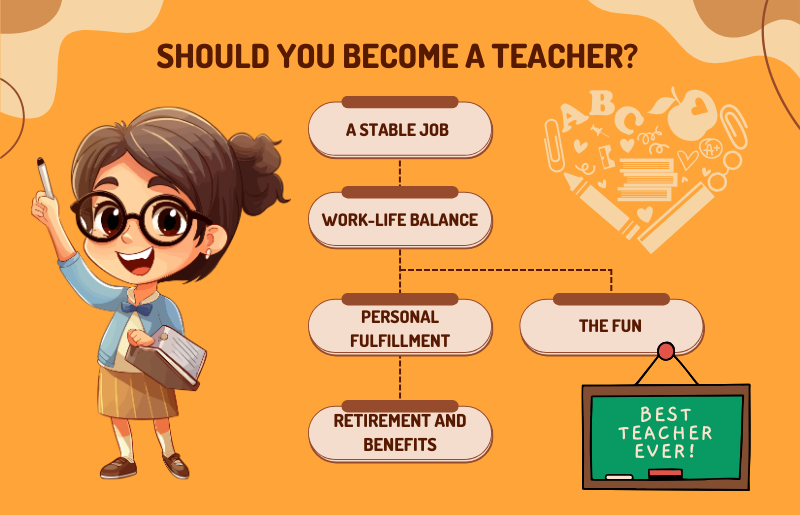Teaching is seen as a respected job. Teachers have shaped many lives over the years. But, is being a teacher a good choice?
We’ll look at the good and tough parts of teaching to help you decide if it suits you.
The Role of Teachers in Society
As mentors in the classroom, teachers ignite curiosity and knowledge in young minds. Guiding learners through life’s complexities, they awaken interests and shape future leaders.
Society owes much to these educators, whose dedication is indeed a mark of honor.
Benefits of Being a Teacher

A Stable Job
Though no career is fully immune to economic downturns, teaching tends to be a steady line of work. There’s a consistent need for skilled educators, and job cuts are not common.
Plus, since teachers often work for public entities or schools, they enjoy a bit more job stability.
Work-Life Balance
Teachers often enjoy a good balance between their professional and personal lives.
They benefit from a routine and get time off during the summer and holiday seasons, allowing them to relax with loved ones or engage in hobbies.
Personal Fulfillment
The joy of teaching comes from seeing students thrive and reach their dreams. It’s a job that offers deep personal fulfillment, as you witness the impact you have on shaping young lives.
Opportunities for Professional Growth
The teaching field is ripe with chances for growth.
Educators can broaden their expertise through various professional events like conferences and workshops.
There’s also room to climb the career ladder, with paths leading to administrative roles or specialization in certain subjects.
Retirement and Benefits
Indeed, teachers typically receive attractive benefits, such as comprehensive health coverage, retirement savings options, and allotted vacation days.
These perks add to a sense of financial security and overall well-being.
The Fun
Teaching is a unique experience that’s both enjoyable and impactful. It’s about connecting with students, sharing in their excitement for learning, and watching them grow. For many teachers, these moments of connection and enjoyment are what motivate them to teach.
However, it’s essential to focus on the main goal: teaching. Fun in the classroom is great, but it shouldn’t overshadow the importance of learning
Challenges of This Profession

Emotional Toll
It’s not uncommon for teachers to face challenging behaviors in the classroom or to encounter students dealing with personal issues. It can be disheartening when a student doesn’t seem to progress, or when a teacher’s hard work isn’t recognized.
Classroom Management
Indeed, mastering classroom management is key for teachers. It’s about balancing firmness with fairness and fostering a classroom where every student feels valued and engaged.
Something not always easy to achieve.
High-Stakes Testing
Both students and teachers might feel the strain, as the emphasis shifts to scoring well on tests rather than cultivating a genuine enthusiasm for knowledge.
Public Perception
Teachers sometimes endure public scrutiny from parents, officials, and the media. This can be tough, leading to feelings of not being good enough or frustration. It’s one of the emotional challenges of the profession.
How to Determine If This Profession Is Right for You

Ask yourself the following questions:
- Are you passionate about making a difference in the lives of others?
- Do you have the patience and empathy required to work with students of diverse backgrounds and abilities?
- Are you willing to invest time and energy in your professional growth?
- Can you accept the emotional ups and downs that come with the job?
- Are you prepared to navigate the challenges of low compensation and public perception?
If you can confidently answer “yes” to these questions, teaching may be a rewarding and fulfilling career choice for you.
As a mentor, I share my knowledge with educators worldwide, believing in the power of collective wisdom to shape a better future.
My leadership has turned Talks With Teachers into a haven for educators to grow and celebrate their profession, truly embodying the organization’s pioneering and caring ethos.







